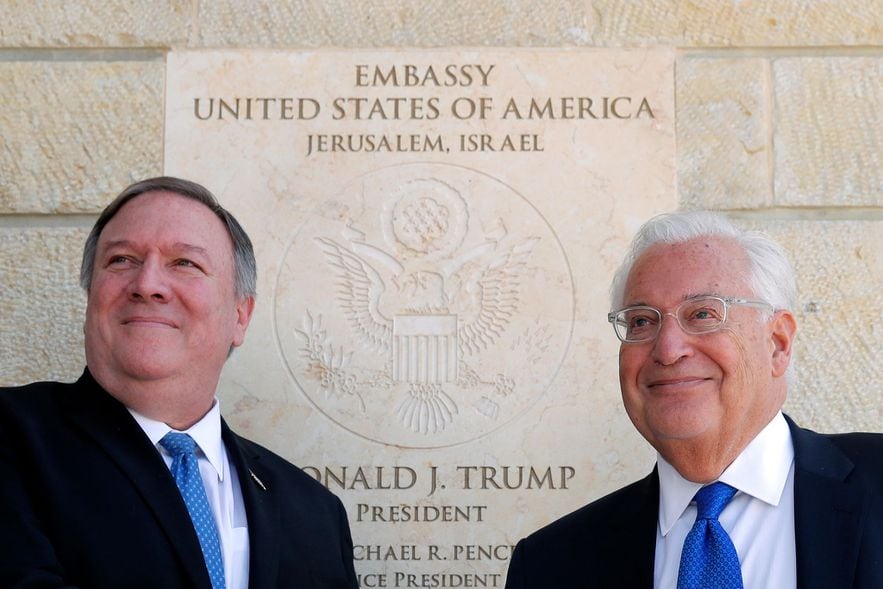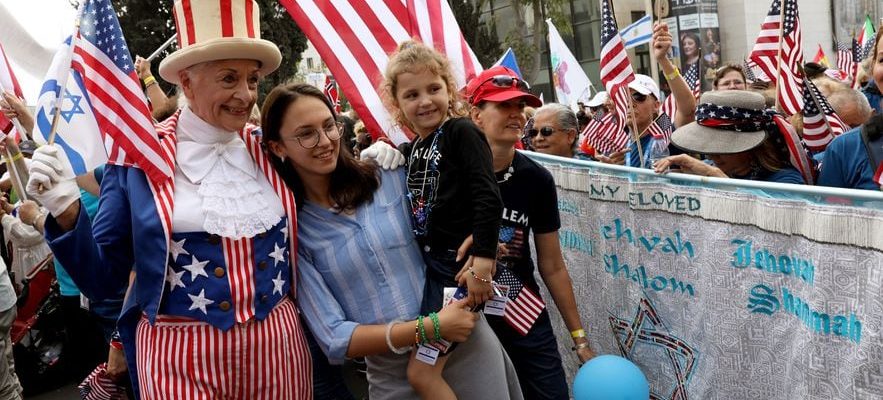Until October 7, all you had to do was pass through the small café located in front of the Tower of David, at the western entrance to the Old City of Jerusalem, to enter the place. Now, the café is cut in two, the large gates to the left of the terrace have been closed, and it is only possible to enter the building for a handful of religious ceremonies, such as the Wednesday morning Eucharist. Security Question. In the aftermath of the Hamas attacks, the place welcomed refugees from Israeli towns near Gaza. And provided food aid to people affected by war or isolated.
These high light stone walls do not, however, house an Israeli government aid center, but the headquarters of one of the city’s many evangelical structures. They have names like Christ Church Jerusalem, International Christian Embassy of Jerusalem or Christians for Israel International, and combine religion, humanitarian activities and politics. Very influential, often rich, they play a crucial social role and have, for several years, been among the best supporters of the Netanyahu government.
Surprising at first glance, their presence draws first of all on the sources of theology. For these Protestant movements, the Bible must, in fact, be read in the literal sense. In their eyes, the prophecy announcing the restoration of the kingdom of Israel will come true not symbolically, but actually. And this will happen in the true Jerusalem. It is therefore necessary, according to them, to encourage the return of Jews to the land of Israel in order to hope for the end of times. In a singular rapprochement between profane and sacred, the Zionist movement, then the creation of the State in 1947, appeared to them as the beginning of the fulfillment of biblical prophecies.
Political support with religious roots
Every year, with the exception of the Covid parenthesis, believers from all over the world stay in Jerusalem, rushing into dozens of buses for half-religious, half-tourist itineraries. They are distinguished from other Christian pilgrims by the choice of visits they make. They ignore the Holy Sepulcher, recognized by Catholics and Orthodox, which has no meaning for them, and prefer the garden of the Tomb, near the Damascus Gate, at the exit of the old city, where, according to them, the “real” tomb of Jesus is located. They are also the rare ones to visit the Knesset, the Israeli Parliament, to meet deputies, or even to go to Israeli settlements in the West Bank to show their political support.
The highlight is the Feast of Sukkot – or Feast of Tabernacles – which commemorates the forty years of wandering in the desert, after the Exodus from Egypt, during which the Hebrews camped in makeshift shelters. To celebrate it, thousands of pilgrims from the United States, Great Britain, Latin America, South Africa and Asia parade through the streets of the old town every autumn. This year again, a few days before the war, they marched singing songs to the glory of God before meeting in a stadium in Jerusalem for an evening of prayer. On this occasion, the Minister of Intelligence, Gila Gamliel, a former minister, Avigdor Kahalani, and several Israeli officials spoke, giving the ceremony a much more than religious dimension.
Mixing genres is not new. In 1980, a diplomatic crisis broke out when the Knesset passed a law proclaiming Israeli sovereignty over all of Jerusalem. As a sign of disapproval, the last 13 embassies still established in the city decided to transfer to Tel Aviv. Symbolically, the International Christian Embassy was created to show support for Israel; it will become one of the most powerful evangelical organizations in the country. Since then, while the other Churches, in particular the Catholic, established before the Six-Day War and the annexation of Jerusalem consider that they live under Israeli occupation and do not always maintain the best relations with the authorities of the country, the Evangelicals do not spare gestures of support, nor proofs of love. “They openly support us and are valuable relays when we want to transmit messages,” confirms Tania Berg-Rafaeli, director of the Interreligious Affairs office at the Ministry of Foreign Affairs. They are all the more so because they reach well beyond the few hundred permanent staff present in Jerusalem. “Their strength is not in their numbers,” confirms Tania Berg-Rafaeli, “but in the fact that they are present everywhere in the world.”
American evangelicals are most active in Israel. (Photo by GALI TIBBON / AFP)
© / GALI TIBBON / AFP
If, for a long time, the Americans have represented the largest battalions, political ties with the United States have been further strengthened since the election of Donald Trump to the White House in 2016. The latter has largely relied on on evangelical groups to get elected. These being fervent supporters of Benjamin Netanyahu, his ultranationalist allies and Israeli settlers, the influence was very quickly felt. Two figures, Vice President Mike Pence and Secretary of State Mike Pompeo, themselves evangelicals, have pushed for the adoption of a policy more pro-Israel than ever.
Several initiatives taken under the Trump presidency bear their mark, such as the plan presented in 2020 by Mike Pompeo providing for a partition including an annexation of all settlements by Israel or the recognition of Israeli sovereignty over the Golan Heights. But the most notable event remains the transfer in 2018 of the American embassy from Tel Aviv to Jerusalem, in which evangelicals played a major role. The inauguration ceremony was opened by a pastor from Dallas, Robert Jeffress, and closed with a prayer said by John Hagee, a Texan with 20,000 faithful. The two men have a questionable reputation: the first is notably known for having made remarks on the fact that “Judaism could only lead to hell”, the second justified Hitler’s extermination of the Jews by asserting that it had allowed their return to Israel. But their support for the American and Israeli right overrides other considerations. “For the Israeli extreme right, which has until now lived in total isolation, this support is unexpected,” notes Denis Charbit, professor of political science at the Open University of Israel. Beyond symbolic gestures, these organizations have millions of dollars, which they willingly devote to the aliyah (return to Israel) of Jews from the diaspora (yesterday often ex-Soviet Russians, now Ukrainians), to aid to the most deprived or to projects extending colonization in the Palestinian territories.

US Secretary of State Mike Pompeo (L) and US Ambassador to Israel David Friedman outside the US Embassy in Jerusalem, March 21, 2019
© / afp.com/JIM YOUNG
If the majority of Israelis display polite indifference towards evangelicals and their influence in the country, a minority of ultra-Orthodox people take a very dim view of their presence in Jerusalem. They fear the proselytism of these believers, quick to express their fervor, and fear forced conversions. Concerned about discretion, evangelicals are careful about the words they use. They do not speak of Church, but of communities or assemblies. They also observe almost total silence about their deep aspirations. For them, the return of the Jews to the land of Israel is, in fact, only a step before the Jews recognize Jesus as the Messiah.
Recurring tensions with Orthodox Jews
Despite these precautions, they have been the target of protest movements in recent years. Last May, a small group of evangelical pilgrims were attacked by religious ultranationalists while they prayed near the Western Wall. At the origin of the call? Aryeh King, deputy mayor of Jerusalem, member of this extremist movement. The proximity of municipal elections initially scheduled for the end of October is undoubtedly not unrelated to the incident, but the latter demonstrates clear tension. To the point of forcing Benyamin Netanyahu to tweet a strong condemnation. Already at the beginning of the year, he had to oppose a bill presented by ultra-Orthodox parliamentarians providing for punishing with two years in prison any “attempt by missionary groups, mainly Christian, aimed at soliciting religious conversion”.
The election of Joe Biden has somewhat rebalanced relations between the Israeli government and the United States, with Democrats being less attentive to evangelicals. But the war changed things. From now on, for Israel, every support is fundamental. “Israeli public opinion is aware that evangelicals do not defend just any vision of Israel, but rather that of colonization. But, today, some say to themselves that these Americans are better than those who express themselves at universities like Harvard, with pro-Palestinian slogans such as ‘from the river to the sea'”, notes Denis Charbit.
The Israeli government understands this well. As early as October, a senior official from the Ministry of Foreign Affairs brought together around twenty figures from the evangelical congregations of Jerusalem for a briefing on the situation accompanied by arguments to be shared throughout the world via religious networks. In the war of communication and influence against Hamas, everyone – political leaders and ordinary citizens – prefer to concentrate on short-term affinities and leave aside deep religious differences. Everyone favors the unsaid, while maintaining the secret hope that at the end of time their God will prevail.
.
